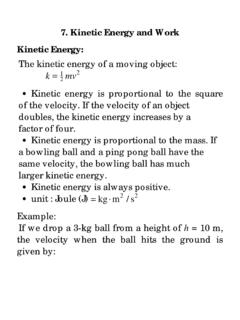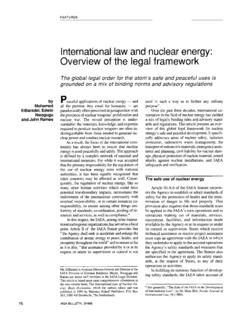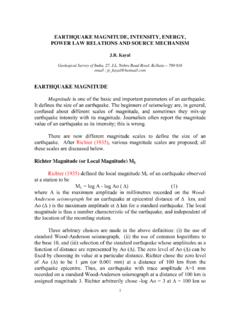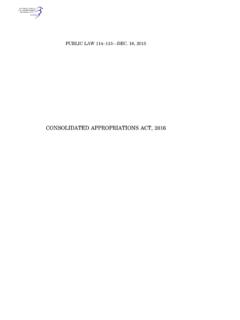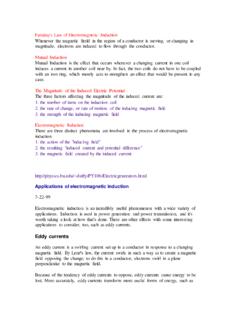Transcription of ECONOMIC AND SOCIAL COMMITTEE AND THE COMMITTEE …
1 EUROPEAN. COMMISSION. Strasbourg, COM(2022) 108 final COMMUNICATION FROM THE COMMISSION TO THE EUROPEAN. PARLIAMENT, THE EUROPEAN COUNCIL, THE COUNCIL, THE EUROPEAN. ECONOMIC AND SOCIAL COMMITTEE AND THE COMMITTEE OF THE. REGIONS. REPowerEU: Joint European Action for more affordable, secure and sustainable energy EN EN. INTRODUCTION. Following the invasion of Ukraine by Russia, the case for a rapid clean energy transition has never been stronger and clearer. The EU imports 90% of its gas consumption, with Russia providing more than 40% of the EU's total gas consumption. Russia also accounts for 27% of oil imports and 46% of coal imports.
2 Share in EU natural gas imports, 2021. Source: European Commission The EU needs to be ready for any scenario. It can reach independence from Russian gas well before the end of the decade. The sooner and more decisively we diversify our supply, accelerate the roll out of green energy technologies and reduce our demand of energy , the earlier we can substitute Russian gas. This communication sets out new actions to ramp up the production of green energy , diversify supplies and reduce demand, focusing primarily on gas, which significantly influences the electricity market and where the global market is less liquid. The focus can be extended to phasing out dependence on Russian oil and coal, for which the EU has a broader diversity of potential suppliers.
3 Accelerating the green transition will reduce emissions, reduce dependency on imported fossil fuels, and protect against price hikes. Rising fossil fuel prices hit energy -poor or vulnerable household consumers particularly hard, who spend a high share of their total income on energy bills1, exacerbating the disparities and inequalities in the EU. Businesses, in particular energy - intensive industries, as well as the agri-food sector face higher production costs. Providing companies and households with affordable, secure and clean energy requires decisive action, starting immediately with price mitigation and storing gas for next winter.
4 1. See the report of the workshop on energy Poverty', organised on 9 November 2016 for the EP COMMITTEE on Industry, Research and energy (ITRE), Gender perspective on access to energy in the EU, Gender and energy | European Institute for Gender Equality ( ) and ( ). 1. I. ADDRESSING THE EMERGENCY. Very high energy prices are hurting the economy. The European Central Bank estimated before the invasion that the energy price shocks will reduce GDP growth by around percentage points in 2022. Continued high energy prices are likely to increase poverty and affect business competitiveness. energy -intensive industries in particular have faced higher manufacturing costs2.
5 High energy prices also mean higher prices for other commodities, notably food. A combination of higher energy , transport and higher food prices would exacerbate the pressure on low income households, with increased risks of poverty. The Commission's toolbox3 of October 2021 has helped mitigate the impact of high energy prices. The measures should be continued as long as necessary. To address the current emergency, the Commission will look into all possible options for emergency measures to limit the contagion effect of gas prices in electricity prices, such as temporary price limits. It will consult as a matter of urgency all concerned actors and propose options in the coming weeks.
6 The Commission will also assess options to optimise the electricity market design to reap the benefits from low cost energy . It will take into account the final report of the European Union Agency for the Cooperation of energy Regulators (ACER) and other contributions on the functioning of the electricity market on benefits and drawbacks of alternative electricity pricing mechanisms. It will follow up as appropriate to keep electricity affordable without disrupting supply and further investment in the green transition. retail prices and supporting heavily exposed companies The Commission confirms that price regulation and transfer mechanisms to help protect consumers and our economy are possible.
7 The legal framework of the electricity market, and in particular Article (5) of the electricity Directive4, allows Member States, in the current exceptional circumstances, to set retail prices for households and micro-enterprises. The Commission provides detailed guidance in Annex 1 to this Communication to help Member States devise schemes for regulated prices. This could be accompanied by incentives for energy efficiency and savings, to reduce energy bills. EU State aid rules offer Member States options to provide short-term relief to companies and farmers affected by high energy prices, and help reduce their exposure to energy price volatility in the medium to long term.
8 For example, Member States can offer temporary relief for companies facing liquidity needs due to current high energy prices, regardless of their size, based on the guidelines on rescue and restructuring5. The Commission will treat those cases 2. Over half of the EU's aluminium and zinc smelters are today operating at reduced capacity or have temporarily closed. The EU has temporarily lost 650 000 tonnes of primary aluminium capacity, about 30% of its total. 3. COM(2021) 660 final of 13 October 2021: Tackling rising energy prices: a toolbox for action and support. 4. Directive (EU) 2019/944 of the European Parliament and of the Council of 5 June 2019 on common rules for the internal market for electricity and amending Directive 2012/27/EU (OJ L158, , p.)
9 125 199). 5 Communication from the Commission - Guidelines on State aid for rescuing and restructuring non-financial undertakings in difficulty (OJ C 249, , ). The aid can be granted in the form of liquidity support (loans or guarantees) for a maximum duration of 6 months for large undertakings in difficulty, or up to 18 months for SMEs. Undertakings that are not in difficulty can also benefit if they face acute liquidity needs due to exceptional and unforeseen circumstances'. 2. with priority with special attention to gas utilities and intermediaries faced with increased supply costs due to contracts disruptions. The EU Emissions Trading System State aid Guidelines6 enable Member States to specifically support sectors that, are most at risk of carbon leakage because of indirect emission costs.
10 In the agricultural sector, State aid rules7 allow investment aid in sustainable energy . In the on-going review of those rules, the Commission's proposal8 under public consultation increases the options to provide support for farmers. The Commission is ready to use the full flexibility of its State aid toolbox in order to enable Member States to support companies and sectors severely impacted by the current geopolitical developments. To enable Member States to remedy the serious disturbances to the economy resulting from Russia's military aggression against Ukraine, the Commission will shortly be consulting Member States on the needs for and scope of a new, self-standing Temporary Crisis Framework9.

